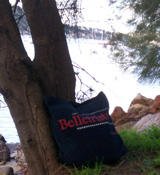

|

|

|
|
US author Sigrid Nunez discusses her new novel with Joyce Nickel |
TRIO: Three remarkable works by Kamila Shamsie by |
Belletrista turns one! A brief retrospective and a look ahead |
|
With this issue, Belletrista completes its first year. We at Belletrista would like to thank those of you spread across this great blue planet who read our little 'zine and also use it as a resource for your personal reading, your bookclubs, or your classes. May we continue to endeavor to deserve your attention in the coming year! With this issue, we debut a new feature we are calling "Conversations" and also our Belletrista blog, "If Written by a Woman," an exciting venture we hope you will all be part of. There are more exciting things ahead! |
|
|
Belletrista - Issue 7
Sept/Oct 2010
 Keep up with the latest
Keep up with the latest news from Belletrista!
Sign up for our email list:

Our Belle bag is traveling! Can you tell where our bag is?

If you are enjoying what you see here in Belletrista, please consider making a donation...
 Archived Issues
Archived IssuesMissed an issue? No problem!
- Issue 6 July/Aug 2010
- Issue 5 May/June 2010
- Issue 4 Mar/Apr 2010
- Issue 3 Jan/Feb 2010
- Issue 2 Nov/Dec 2009
- Issue 1 Sept/Oct 2009




 Follow us on Twitter!
Follow us on Twitter! @Belletrista













